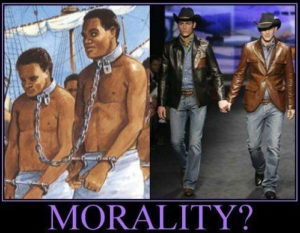Interesting isn’t it that only theists seem to feel that there is a conflict between being atheist and being “moral”?
Most agnostics and atheists do not find a direct link between the two.
The problem arises because of people of faith ~ any faith ~ tend to equate their morality with the strictures of their beliefs. The two are intrinsically entwined, with the result that they cannot imagine the one standing free of the other. Indeed there is an (atheist) argument for saying that this is the purpose of religion. Namely, that Religion is an artificial construct to give a structure to a system of morality, which cannot be gainsaid on pain of something-much-worse-than death.
All religions require belief in one or more all-powerful or at least super-powerful being(s) who have the ultimate judgement over our actions. They will determine the degree of rightness or wrongness of our behaviour and will decide whether we can enter heaven or nirvana or whatever eternal-paradise-equivalent the faith projects (or at least move up a rung or two towards it in those systems that take many lifetimes to reach the eternality).
 The consequences of immoral action as defined by the faith are the foundation upon which the ethical framework rests. The myths and legends or if you prefer gospels and holy books and the parables therein illustrate by example and precedence, but in the event that the illustrations do not adequately define the rationale behind the morality, there is the final overriding injunction: because [insert divinity or saint or scribe of choice] said so! In the manner of a parent teaching a child: don’t do as I do, do as I say even if it is often transmuted into doing as I do’ the do as I say’ part still holds on a simple because I say so’.
The consequences of immoral action as defined by the faith are the foundation upon which the ethical framework rests. The myths and legends or if you prefer gospels and holy books and the parables therein illustrate by example and precedence, but in the event that the illustrations do not adequately define the rationale behind the morality, there is the final overriding injunction: because [insert divinity or saint or scribe of choice] said so! In the manner of a parent teaching a child: don’t do as I do, do as I say even if it is often transmuted into doing as I do’ the do as I say’ part still holds on a simple because I say so’.
To expect mere humans to accept such jurisdiction of the higher power without laws or guidelines clearly isn’t workable so the “Law” is laid down so that we shall know how we must behave.
The theory is that without such “law” we would be nothing more than animals, marauding mercilessly across the planet, creating all sorts of havoc and destruction.
Well, actually, I think you’ll find that even in the presence of such “Law(s)” we are doing precisely that.
And, incidentally, that the allegedly lawless animals are not.
To backtrack just a sentence or so: in the absence of the “law” and the faith, we ARE nothing more than animals. That is a fundamental tenet of most atheist belief systems.
We are a part of an overall system which includes sentient and non-sentient life and also active mechanisms which may or may not be considered life’ depending upon one’s definitions and timescales: for example is a planet that takes in energy and gives it out in a changed form, that moves and changes, grows, shrinks, and ultimately dies, a life form? On that definition alone probably not: the fundamental of reproduction’ is missing. But what if its death is explosive rather than implosive and results in fragments which over aeons gather back together and form (over even longer ages) another planet? Is it possible? I’ve no idea. The question is: if it were if it is, does that make the planet itself “alive”?
Why do we need to be MORE than any of the other species in order to behave appropriately in a manner that serves and protects the system i.e. to behave morally or ethically?
If morality is defined as: “manner, character, proper behaviour, a code of conduct acceptable to all” without reference to limiting descriptors (such as Christian morality, Moslem morality, Nazi morality, Communist morality) then by definition it must be a concept which can stand outside of any faith-based definitions of what constitutes “good behaviour”.
The acceptance that we are merely part of a whole is to my atheist mind what all of the prophets were trying to tell us. All of the holy books and histories and oral myths show parallels and equivalences which are just too close together for them not to be multifaceted attempts to simply explain the universe (and beyond) to a species completely incapable of understanding it.
There are many elements to these interlinks and cross-overs, but the two that matter here are:
(1) Man has great power over the planet. by the time religion came along, this was fairly obvious.
(2) Nevertheless: Man is not in charge. There’s a whole system of “stuff” out there that even now we don’t really understand, much less have any chance of controlling: weather, climate, plate tectonics, volcanicity, meteors, the behaviour of the sun.
How does this bear upon the atheist and morality? Simply this: if you know you have a great deal of influence, and at the same time you can be wiped out in the blink of an eye, you should be uplifted and grounded. You should be aware of your power and of your powerlessness.
These are the bedrocks of atheist morality.
I have the power, so I should use it wisely.
My power is not infinite, so I should use it humbly.
“Should” ~ not “must”. This is a value judgement, not any kind of imperative. I can use it any which way I choose. As a moral person, I choose to try to be wise and to be humble.
What then would an atheist morality look like what elements might it encompass?
The golden rule: do as you would be done by. This is an inescapable rule if you would not wish someone to treat you in a certain way, you can assume that it is unfair of you to treat anyone else in that fashion. That certainly covers the “not killing” and “not stealing” bits of most faith injunctions. It could also cover other elements such as covetousness, respect for elders etc, adultery if those are things which, as an atheist, you choose to make moral judgements about as many atheists do.
Fairness, that very concept. This means not only to treat others as you would wish them to treat you, but to determine how you treat varyingly characterised “groups of others” or members of such groups those of different race, or colour, or creed, or ability, or lifestyle preference and to ensure that no one group is treated adversely or favourably in respect of another.
 Protect the weak. In practice this can conflict with the point above, since it will involve treating one group more or less favourably than another, but it is an extension of the Golden Rule: not only to do unto others as you would be done by but also to endeavour to seek to ensure all others are so treated by everyone else.
Protect the weak. In practice this can conflict with the point above, since it will involve treating one group more or less favourably than another, but it is an extension of the Golden Rule: not only to do unto others as you would be done by but also to endeavour to seek to ensure all others are so treated by everyone else.
Conserve the planet. The degree to which this entails extreme sanctions on consumption, or merely committing to reduce, reuse, recycle or the degree to which animals may be utilised or treated with all the accord we grant out own species are ethical judgements. Many, if not most atheists will agree that some degree of conservation is not just a matter of self-interest, but is a moral imperative in terms of leaving the world in no worse and preferably a better state than we found it.
Of course, if you chose an atheist at random they might subscribe to some or all or none of these elements. They may have others or none at all. Clearly there are amoral atheists out there. (I would also contend that there are a fair few amoral protagonists who claim to be of one religion or another, or worse yet use that religion to justify their immoral actions.)
The point to be made is not that all atheists ARE moral but rather that the mere fact of not believing in a deity does not automatically mean that you do not have a code even if only a personal one against which you measure your actions. I am an atheist. And I do.
And yes, sometimes I am found wanting.
The difference is: I am accountable here and now not in some potential hereafter, which grants me the ability to simply atone and wipe the slate clean. My slate is never wiped clean it is merely an unending balance sheet of good stuff versus bad stuff. No one will weigh it in the final judgement to my mind it is weighed on a daily basis by those it affects, and by me, and between us, we try to redress the balance as required.







